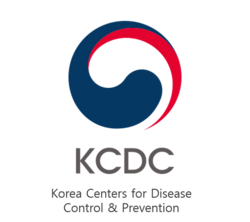Organization:Centers for Disease Control and Prevention Korea
From HandWiki
| 질병관리본부 疾病管理本部 | |
 | |
| Agency overview | |
|---|---|
| Formed | 18 December 2003 |
| Jurisdiction | Government of South Korea |
| Headquarters | 187, Osongsaengmyeong 2-ro, Osong-eup, Heungdeok-gu, Cheongju, Chungcheongbuk-do, South Korea |
| Employees | 862 |
| Agency executive |
|
| Parent department | Ministry of Health and Welfare |
| Child agency |
|
| Website | https://www.cdc.go.kr/cdc_eng/ |
Centers for Disease Control and Prevention (Korean: 질병관리본부; Hanja: 疾病管理本部, KCDC) is an organisation under South Korean Ministry of Welfare and Health responsible for organ transplant and advancement of public health by managing prevention, survey, quarantine, trial and research on infectious diseases, chronic and rare illnesses and injuries. It was founded in December 2003 and is located in Osong Health Technnolgy Administration Complex in Cheongju. The organisation is led by vice-ministerial-level Director of KCDC.
History[1]
- July 1949: Central Health Centre was created under Ministry of Health
- January 1960: renamed to Central Health Institute
- August 1960: renamed to National Institute of Health
- December 1963: merged with National Chemical Laboratories, National Laboratory of Herb Medicine and National Institute of Public Health Training
- February 1967: renamed to National Institute of Public Health Training
- November 1981: renamed to National Institute of Health
- December 1994: re-organised under Ministry of Health and Welfare
- December 2003: changed to current KCDC
- December 2010: moved its headquarters to Osong
Organisation[2]
Director of KCDC
- Administration
- Bureau of Planning Coordination
- Center for Public Health Emergency Preparedness and Response
- Center for Infectious Disease Control
- Center for Laboratory control of Infectious Diseases
- Center for Disease Prevention
- Center for Korean Network of Organ Sharing
Child Agencies
- Korea National Institute of Health (KNIH)
- National Quarantine Station
- Incheon Airport Quarantine
- Gunsan Quarantine
- Ulsan Quarantine
- Busan Quarantine
- Mokpo Quarantine
- Gimhae Quarantine
- Incheon Quarantine
- Yeosu Quarantine
- Pohang Quarantine
- Masan Quarantine
- Tongyeong Quarantine
- Donghae Quarantine
- Jeju Quarantine
References

